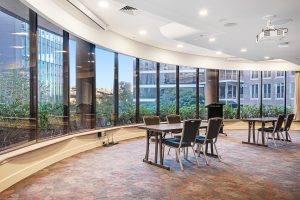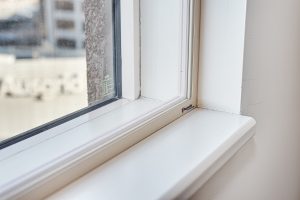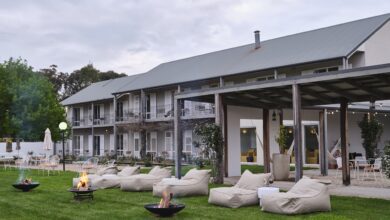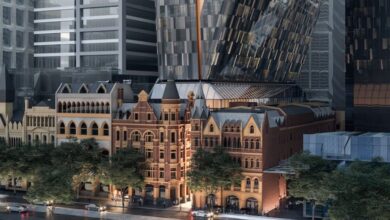
Silencing hotel noise is sound advice
Nothing destroys an accom's reputation more than savage reviews about its acoustics but there is a lot that can be done to silence the noise
So, you check into the fabulous five-star big-city luxury hotel. The view from your room is stunning, the spa bath soothing, the champagne delightful. You drift off to sleep ensconced in the lap of luxury and comfort… Then at 2am a siren from the street below almost scares you to death!
Your heart rate just gets back to normal at 4am when the couple in the next room stagger home and to a chorus of slamming doors have an argument that lasts until 5am. At 6am a jackhammer shakes you from your bed.
Our latest AccomNews print issue is available now. Read it HERE
Few experiences destroy a hotel’s reputation more savagely than reviews about noise.
A property can boast the most beautiful furniture, décor, vistas, and service, but if a guest’s sleep is disturbed, it can be goodnight for repeat business.
Excessive noise can ruin the guest experience, and forever stain a property’s reputation.
The typical noise problems for hotel guests come from traffic, construction, and loud neighbours in the room next door, and these problems are amplified if the guest has checked in with a bout of jet lag after a long flight.
Effective noise control, though, means that hotel managers can sleep soundly in the knowledge that their guests will be talking about their peaceful and enjoyable stay, aware that word of mouth makes the biggest noise in the accommodation business.

Adrian Lafleur, who started a business called Magnetite 25 years ago, has specialised in soundproofing through double glazing for the last two decades. His company has been flat out in recent times soundproofing properties either side of construction zones in Sydney as new tunnels and roads make it onto the map.
At the moment Magnetite is working at PARKROYAL at Sydney’s Darling Harbour, adding soundproofing through double glazing to the existing 370 windows.
“We’ve been completing the project in two phases,” Mr Lafleur said. “We started before COVID and restarted in January this year. We will probably be about two and a half months on site.
“The hotel is right on Sydney’s Western Distributor, and you get a fair bit of foot traffic down below as well. Because it’s a working hotel it’s not like we’ve got free rein and can come and go as we please. We can only work on a certain number of rooms at a time so that they can retain occupancy. We are working with the management to get one floor ready at a time and they pick and choose the rooms that we go into each day.”
The problems of noise affecting sleep quality are so great in European cities that the World Health Organization has established Night Noise Guidelines, which outline the potential risk to human health of constant noise and disrupted sleep.
For existing hotels, a good time to install noise reduction products is during renovations.
The areas that can be subject to soundproofing include:
- Windows: Adding double glazing.
- Floors: Adding soundproofing underlay.
- Ceilings: Using decoupling methods (dual-layered drywall) and noise dampening ceiling tiles.
- Doors: Changing to solid-core heavy doors with seals, and doors that don’t slam loudly.
- Walls: Adding insulation between walls, using soundproofing paint and installing noise-dampening wall panels.
There are even more advanced methods of reducing noise.
In 2011, Premier Inn pioneered a new design of a “floating bedroom”, at its hotel in London’s Leicester Square, which had a popular nightclub on the ground floor. In this literally ground-breaking design, each bedroom became an independent box with no contact with neighbouring rooms. Walls and ceilings were also given acoustic linings, and windows quadruple-glazed.
Holiday Inn Express hotels in the United States now use a special internal sliding door to cut noise from hotel corridors, and they have also installed new beds with noise-reducing headboards which can cut noise by about a third.
Hotel chains such as the Hyatt, Marriott, and Ritz Carlton, also offer guests at some of their properties the use of a white-noise machine to drown out external sounds.
Magnetite specialises in the installation of a secondary internal system to complement the existing windows to soundproof rooms.
“We’ve done a lot of testing on the product and generally we’re getting from 50 to 70 percent noise reduction,” Mr Lafleur said.
“So, it is very effective. Generally, you find in hotels because they are multi-storeys, they’re a pretty solid build. It’s not like houses where sometimes you can have thin walls. Most of the noise in hotels is coming through the windows so our system creates a dramatic difference.
“We do a lot of installations in existing hotels, so management doesn’t have to change the windows and they can stay operational while we’re doing the work.
“We install secondary timber windows and secondary aluminium windows in the more traditional style motels that have windows that open.
“Sometimes we install secondary doors.
“But we also have our proprietary system that we use that works great when you have windows that are large, fixed panels. Our framing is quite slimline and we use magnets to click in the second layer of glazing.
“In all situations, we’re trying to create a good air gap between the existing window and the system we put in. It’s that air gap that gives you the soundproofing and the bigger the gap the bigger the noise reduction.”

Magnetite performs soundproofing in all kinds of properties from residential homes and motels to major hotel chains.
“It’s not a problem for us if it’s one window or 600,” Mr Lafleur said. “I started the business 25 years ago with my brother.
“We’re originally from Ottawa in Canada and we knew about double glazing from the temperature side. We thought most of our work would be to keep houses warm.”
He said the Sydney Airport Noise Amelioration Program in the late 1990s brought a big focus on the importance of noise reduction in people’s lives.
“The demand for noise-reducing double glazing was pretty much instantaneous. In places like Canberra we still do a lot of thermal protection but we have offices around Australia and most of our work in the cities involves noise reduction,” Mr Lafleur said.
“Traffic noise is the big one for us to overcome, but we also work on properties that are having trouble with construction noise.
“We just did work at the Marriott at Circular Quay in Sydney. Their conference rooms are right across the street from a building that is being knocked down and rebuilt over three years. Train noise is also a problem for a lot of accommodation properties near railway lines.
“The work we do is very important because noise makes a huge difference when it comes to people’s comfort.
“And when people check into a hotel, comfort and a good night’s sleep are their main priorities.”
Grantlee Kieza OAM has won three Queensland Media Awards, two Australian Sports Commission Awards and has been a finalist for the Walkley and News Awards and for the Harry Gordon Award for Australian sports journalist of the year. In 2019 he received the Medal of the Order of Australia for his writing. You can find more of his work in our AccomNews & Resort News print magazines.
He has written 22 acclaimed books, including bestsellers Hudson Fysh, The Kelly Hunters, Lawson, Banks, Macquarie, Banjo, Mrs Kelly, Monash, Sons of the Southern Cross and Bert Hinkler.







